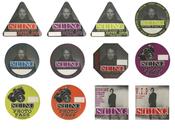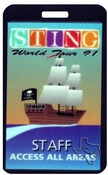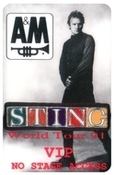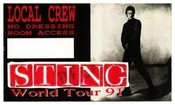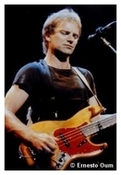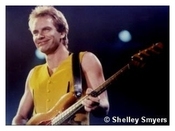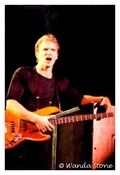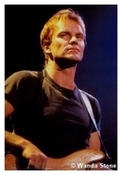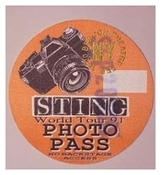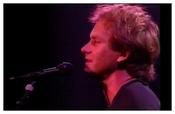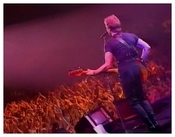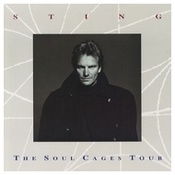
Soul Cages
Feb
15
1991
New York City, NY, US
Beacon Theatrewith Kennedy Rose, Vinx
He's Sting, they're stung...
There was nothing wrong with Sting's show that a bevy of dancing whales in slit skirts couldn't have livened up. But that's a joke, and one shouldn't joke about endangered species, especially the rock and roll variety.
Dissatisfied with his role as the Mel Gibson of rock, Sting has developed a messianic complex; he wants to teach, to inspire, to lead his people to the promised land of easy-listening jazz. He prefaced one of the songs he performed on Friday, 'Mad About You' from his current project 'The Soul Cages', with the story of David and Bathsheba, on which the song is based. Even if you'd heard the story before, it was a precious moment.
The singer and bassist, who appeared with a pared-down band that included Dominic Miller on guitar and David Sancious on keyboards, is at a point in his pop idolness where he can generate excitement just by showing up. And on some numbers in Friday's opening show - which began a six-night stand at the Beacon - he did just that. The more familiar material, some from his Police days - 'Roxanne', 'Message In A Bottle', 'Walking On the Moon' - seemed to be tossed off (background vocals were glaringly absent). The newer songs he played with a seriousness that bordered on self-absorption. The audience, which came with love in its heart, was never even toyed with.
The evening started off promisingly enough, with 'All This Time', the single from 'Cages' and the most accessible thing on it. For all their political correctness and sophisticated chord changes, Sting's songs can get themselves stuck on your brain's turntable (excuse us, CD player). But he seems to think that being entertaining and progressive are mutually exclusive. Asking for requests early on in the show, Sting feigned surprise, and what seemed like true irritation, that people were screaming for 'Roxanne' and not one of his eco-relevant tone poems. When he announced a set of four songs ''loosely connected to the sea'' the audience became loosely connected to its seats. When he kicked into Jimi Hendrix' 'Purple Haze', people streamed back in from the lobby. There seems to be a connection here that's passing him by.
Playing 'Purple Haze' was kind of a wink at the audience; incongruous, perhaps, in a fun way. What's incongruous and boring, however, is dropping discordant Monkish passages into songs where they don't fit, just to prove you've been listening. Attempting to widen the range of your art is admirable, and so are Sting's political sensibilities, but the way he handles both make his songs sound self-righteous. And playing your older music (and how old is it anyway?) with the attitude that the listener should be satisfied with the fact that it's Sting on stage serves only to alienate, something Sting's public persona leads you to believe would offend his very soul. But for all his intense posturing, passion seems equal weakness for Sting, and that's fatal when you're playing anything resembling rock.
The people who came to hear Sting may not be ready to follow him as he follows his muse; probably, it's a character flaw on their part. How else can you explain their lack of involvement in Friday's show? It was hard to miss, even for Sting, especially during one call-and-response that elicited a rather weak response. ''I've got a sneaking suspicion,'' Sting said, ''you can do much better than that.'' Likewise, we're sure.
Sting's opening acts were Kennedy Rose, a female duo who didn't do much to get things moving, and the singer/percussionist Vinx, who did. Both record for Sting's Pangaea label, which Kennedy Rose's Mary Ann Kennedy said was devoted to ''music without boundaries''. Friday evening gave one new respect for boundaries.
(c) Newsday by John Anderson
Sting's stand stuns...
He said he likes it close. Almost conversational, in a sophisticated way - and what Sting likes - Sting gets.
That's why the show was staged at the intimate Beacon Theater. That might be why the opening night of Sting's six-show stand was so stunning. No megadome laser theatrics, just music by a very charming performer.
In an up-close theatre like the Beacon, it's easy to feel you participate in the show rather than just watched it. That never happens in the arenas.
Friday's two-hour concert featured almost all of the recently released 'Soul Cages' and most of his best known songs. Because Sting often writes about serious subjects - life , death, global unity - he's been nailed with a bum rap as a dry performer.
He isn't. All you have to do is to hear his covers of either Hendrix's 'Purple Haze' or Bill Withers' 'Ain't No Sunshine When She's Gone' to know that reputation is bogus. He's tightly wound and gives a song his all - sweating a river to deliver every number with wallop. It's not an act, the guy just tries harder to get the most out of the music.
Even though Sting says he has a hard time singing 'Roxanne' since it's become elevator music, he did an outstanding job with it. His breathy vocals on 'Roxanne' were the spark that lit the concert.
A late-show quartet of songs about the sea slowed the momentum, but the pace was restored quickly with a jazzy rendition of 'Tea In The Sahara', which moved the crowd to snap fingers to keep time.
But the encore tune of 'Every Breath You Take' (like 'Tea', it's from The Police's 'Synchronicity' album) was the evening's best piece. The extended jams gave everyone in the band (especially guitarist Dom Miller) room to show their stuff. Even the two opening acts, Kennedy Rose and percussionist Vinx, stepped out of the wings to sing backup.
The remaining shows - tonight, tomorrow and Wednesday - are sold out, but scalpers outside the Beacon are getting $40 a ticket (that's $8 above cost).
(c) The New York Post by Dan Aquitalane
Odyssey of personal loss...
''One reason that I wanted to play here instead of the Enormo-Dome was so I can see you; Sting announced to the adoring sell-out crowd on the first of his five nights at this cosy, ornate Manhattan theater. ''But also, I wanted the music to be intimate, more fun and, he added with a slight hopeful lift in his voice, ''more sophisticated.''
Leading his new road band on a shakedown small-theater cruise before he hits the arena trail, Sting certainly looked more relaxed and acted more personable than you'd ever expect from those po-faced portraits on his solo albums.
The chuckles quotient was up, too, compared to the air of fusion sobriety that marked his earlier jazz-rock sorties. Sting was not above poking fun at his own reputation for superstar hauteur, introducing 'Mad About You', from 'The Soul Cages', as a song about the biblical tale of David and Bathsheba - the kind of story that has everything I like: power, greed and sex.'' And there was plenty of bar-band spunk in his cover of 'Purple Haze'.
As for sophistication, the man really doth fret too much about the highbrow factor in mainstream rock. About a third of the way through the show, Sting departed from his basic new-album-Police-oldies script with a simple but stunning cover of Bill Withers's 'Ain't No Sunshine', navigating the song's pained highs and melancholy lows with full-bodied, and utterly unaffected, soulful clarity. Which only showed that Sting doesn't always need the epic lyric gesture or grand art-song flourish to make compelling pop.
Actually, some of the songs on 'The Soul Cages' were more listener-friendly onstage, performed by Sting's new slimline quartet, than they are in the album's extended, sometimes icy, grief suite context. There was certainly more elegiac fire than arty frost in his delivery of 'Why Should I Cry for You?' while the coltish version of 'All This Time' echoed his late-period Police work.
The odyssey of personal loss and spiritual rediscovery that consumes Sting on 'The Soul Cages' is arguably of only minor interest to most of his fans - particularly those who leapt out of their seats when, in mid-set, he suddenly detoured into Oldiesville with 'Roxanne'. But there was no denying his own vocal and emotional investment in the new songs or, as with 'Why Should I Cry for You?' the universal truths lurking therein.
Hubris nearly got the best of him, though. Sting practically torpedoed the whole show at the end by stringing four songs from 'The Soul Cages', including the longest and slowest ones on the album, into one protracted, twenty-minute endurance test. The dark, catchy chorus of the title track aside, everything - melodies, rhythms, Dominic Miller's ambient guitar wash, David Sancious's meditative keyboards - dissolved into a sombre sonic fog. By the time the comparatively sunny hook in 'When the Angels Fall' eventually poked through the clouds, it was too little too late.
It took 'Purple Haze', a brisk stampede through 'Message in a Bottle' and an inspired encore reading of 'Every Breath You Take' to bring the show, and the crowd, back to life.
It was the Police songs, in fact, that highlighted the pros and cons of Sting's stripped-back band, which is just a Police-style power trio - guitar, drums (played by Vinnie Colauita) and Sting on bass and vocals - augmented by Sancious's keyboards. Miller was overly restrained, opting for drowsy strumming and pastel, ECM-style harmonics that sounded particularly inappropriate on uptempo numbers in which Andy Summers's spiky riffing and power-chord punctuation had been distinguishing features.
There were times as well, like 'Roxanne' when Sancious's piano spice seemed a bit superfluous. But the band will surely find its own musical equilibrium with continued gigging, and while this is a smaller, less versatile unit than Sting's previous high-pedigree jazz bands, it demonstrated good jamming spirit in the Weather Report-ish take of 'When the World Is Running Down' and the spongy reggae marriage of 'Tea in the Sahara' and 'Walking on the Moon'.
So, will it all work in the EnormoDomes? Well, you can bet the fans up in the far balconies will have trouble fighting off the sandman during that funereal 'Soul Cages' medley. But you can also bet it won't take much - like 'Ain't No Sunshine' or 'Every Breath You Take' - to bring em around, fast.
(c) Rolling Stone by David Fricke
Introspective songs from a melancholy Sting...
Sting has never lacked ambition, and on his current tour he tries to do three things simultaneously.
One is to present the songs from his new album, 'The Soul Cages' (A&M), a largely sombre extended song cycle about a father's death, the sea and the loss of faith. The second is to forge a small rock band (just four players) that has the ensemble spirit and improvisational moves of a jazz group, as did the Police, Sting's first hit-making band. A distant third priority is to please his fans.
On Friday night at the Beacon Theater, opening a sold-out engagement through Wednesday, the first ambition was fulfilled, but on the two others he fell short; many people walked out before the concert ended.
Sting has always had a melancholy side, but in songs like 'King of Pain', he used to hold the self-pity in check with concise pop melodies. On 'The Soul Cages', he indulges his melancholy and his bookishness; long-winded lyrics stretch out in suitelike songs. Yet on purely musical terms, the concert's best songs were the album's measured new ballads, particularly 'Why Should I Cry for You?'
The songs had a slowly swirling grandeur, coalescing into anthemic choruses and then dissolving like the waves Sting seeks to evoke, and the band followed the album's arrangements, never rushing or overplaying their stately progress behind Sting's reedy vocals. But they are essentially introspective songs, and since they were unfamiliar to many in the audience even Sting's charisma couldn't turn them into shared catharsis rather than a careful recital.
In the songs that should have buoyed the audience, including Police hits ('Roxanne', 'Message in a Bottle') played in Police style the band was having an off night. With Sting on bass and Vinnie Colaiuta on drums; the band's front line is stylistically divided; Dominic Miller is a rock guitarist while David Sancious on keyboards (and occasional guitar) dips into classical elegance but is well grounded in jazz piano, particularly the advanced harmonies of Herbie Hancock.
Unfortunately when the band tried to toss around improvisational lines and fills, the music just grew cluttered. The culprit was apparently Mr. Miller, whose overuse of sustain and reverb effects made his playing sluggish; his solos kept falling back on hard-rock clichés.
The band deliberately invites comparisons with the Police - only its version of 'Tea in the Sahara' reworked the old rhythm - and by any such comparison, it suffers.Two groups on Sting's record label, Pangaea, opened the concert: Kennedy-Rose, two women singing cloying songs about love and Vinx, whose, combination of rapid-fire drumming; (on one-or-two-hand drums) and warm singing sounds like Olatunji backing Al Jarreau.
It's hard to tell if his songs are more than novelties, but Vinx displayed a genial stage presence and a mischievous sense of humour between the volleys of cross rhythms.
(c) The New York Times by Jon Pareles
Sting and fans hit on level ground...
One might be forgiven for taking that added precaution and donning a gas mask for the east coast launch of Sting's new roadshow.
Between the cerebral intentions of two light-immersion popular jazz LPs and a succession of vaunted human rights and environmental campaigns on his solo resume, the former leader of The Police might well ascend the platform of a young decade with pithy baggage from any imaginable conceit. But there are the imponderables of creeping middle age and the recent death of a parent further clouding the sightlines on Sting's artistic horizon.
And don't even mention war. Last month, the release of 'The Soul Cages', the British pop singer's first record since 1987's 'Nothing Like The Sun' suggested a pragmatist's agenda, straddling the circumference of airy jazz/funk fusion and pop melody with lyrics of dense, personal philosophy.
Those suggestions and more were confirmed Friday night, as Sting and a minimalist backing band - drummer Vinnie Coaiuta, David Sancious on keyboards and Dominic Miller on electric guitar introduced a clarifying, populist compromise to the bass player's enigmatic duality.
Nearing his 40th year, Sting treated a capacity crowd at Manhattan Island's 3,600-seat Beacon Theatre to a greatest hits/deepest misses package-for-the-people. At 85 minutes, the 19-song revue - due at the SkyDome March 15 - strikes a concessionary resolution to the dilemma of an audience and an artist on different musical and political planes. He gave them this much: A retrospective of obvious staples from The Police discography, some altered to better suit the fusion-minded ensemble. And from the pseudo-ska singalong of 'Roxanne' through an extended cocktail jazz reading of 'Walking On The Moon', Sting's familiar past came in calculated clusters, spilled like Sugar Twin between stark, sonorous swallows from a full seven pieces of the eight-song 'Soul Cages' release.
Together with opening and closing appearances by country- folk singing duo Kennedy Rose and jazz percussionist Vinx - both acts are signed to the headliner's Pangaea Records label - the show might well be dubbed Sting And The Family Sly.
If the tour is a radio fan's best dream - standing ovations answered a final roundup of 'Tea In The Sahara', 'Every Breath You Take' and, for last encore, the languid flamenco lullabye 'How Fragile We Are' - it must be less for the performer.
''I understand human nature, I know you come to hear what's familiar to you,'' Sting said, inviting requests for the first triplet of Top 40. Minutes later, he was drowned out by more requests while trying to draw a metaphoric link to his father's death in a four-song sequence of new work - 'Island Of Souls', 'The Wild, Wild Sea', 'The Soul Cages' and the ethereal set-piece 'When Angels Fall'. Though the audience received it with relative impatience, the introspective passage of new music brought the night's truest musical moments.
Unbound from the busier ensembles of his previous tours, Sting seemed far more comfortable finding his own pockets as bassist in this quartet. The effect was spare and dramatic, bringing to life 'The Soul Cages' with delicate time changes and harmonic variation. Percussionist Vinx, whose upcoming debut record was produced by Sting, is expected to remain on the Canadian leg of the tour. Kennedy Rose will be replaced by Concrete Blonde.
(c) The Toronto Star by Mitch Potter
Conveying soul-to-soul messages...
Intimate. Conversational. Sophisticated. Words rarely associated with rock concerts. But Sting used these terms to describe the show he was aiming for Friday night at The Beacon Theater in Manhattan.
Barely two songs into the set, the goal seemed in focus. Two hours later, Sting had scored a brilliant triumph. The small, cosy confines of The Beacon contributed to the concert's intimacy. But Sting's music and relaxed manner generated the real feelings of warmth and closeness.
That Sting was able to create this rapport without pandering to rock concert clichés was a testament to his skills as an artist. Performing almost all of the songs from his latest album, 'The Soul Cages', only the instrumental 'Saint Agnes and the Burning Train' was missing, Sting challenged the audience to travel with him through intensely personal terrain. (The sombre song cycle that is 'The Soul Cages' grew out of Sting's soul-searching after the death of his father.).
Sting's frustration and despair fill the title track, 'Island of Souls', and 'Why Should I Cry for You?' But these are universal feelings, and by using a combination of impassioned reedy vocals and stirring instrumentals, Sting made his listeners examine their emotions through the show. However, unlike the album, which can leave a listener questioning one's faith and feeling a bit hopeless, the live performance generated feelings of hope, and, at times, exuberance.
The smaller musical unit with which Sting is working deserves part of the credit. With a back-to-basics band, Sting on bass, Dominic Miller on guitar, David Sancious on keyboards, and Vinnie Colaiuta on drum, providing the instrumentation, many of the songs of 'The Soul Cages' throbbed with a propulsive rock edge, instead of twirling to moody orchestral textures dominant on the album.
Sancious, who at one time performed with Bruce Springsteen, was the group's mainstay, providing the delicate colour and texture for the ballad 'Why Should I Cry for You?' and the edgy tension for 'Mad About You', a powerful song about obsession.
While Miller's stage presence was understated, his play was anything but, as his guitar lines sent 'Jeremiah Blues, Part I' and 'The Soul Cages' soaring. Colaiuta, meanwhile, kept a firm, steady rhythm throughout.
The pacing of the show was impeccable, as songs, both thematically and musically, flowed one into the other. Questioning his grief and inability to mourn in 'Why Should I Cry For You?' Sting seemed to find an answer as he segued into a bluesy jazz rendition of Bill Withers' 'Ain't No Sunshine When You're Gone'.
A four-song cycle, incorporating 'Island of Souls', 'The Wild Wild Sea', 'The Soul Cages', and 'When the Angels Fall', alternately gentle and powerful, haunting and hard-hitting , allowed Sting to emphasise the redemptive power of the sea, a recurrent theme of the new album.
The tightness of the band's play and the energy with which the group attacked the arrangements harkened back to Sting's days with the Police, which he obviously noticed.
It was with relish that Sting performed Police hits such as 'Roxanne', 'Message In a Bottle', and 'Every Breath You Take'.
Friday's was the first of six sold-out concerts at The Beacon Theater.
(c) The Bergen Record by Barbara Jaeger
There was nothing wrong with Sting's show that a bevy of dancing whales in slit skirts couldn't have livened up. But that's a joke, and one shouldn't joke about endangered species, especially the rock and roll variety.
Dissatisfied with his role as the Mel Gibson of rock, Sting has developed a messianic complex; he wants to teach, to inspire, to lead his people to the promised land of easy-listening jazz. He prefaced one of the songs he performed on Friday, 'Mad About You' from his current project 'The Soul Cages', with the story of David and Bathsheba, on which the song is based. Even if you'd heard the story before, it was a precious moment.
The singer and bassist, who appeared with a pared-down band that included Dominic Miller on guitar and David Sancious on keyboards, is at a point in his pop idolness where he can generate excitement just by showing up. And on some numbers in Friday's opening show - which began a six-night stand at the Beacon - he did just that. The more familiar material, some from his Police days - 'Roxanne', 'Message In A Bottle', 'Walking On the Moon' - seemed to be tossed off (background vocals were glaringly absent). The newer songs he played with a seriousness that bordered on self-absorption. The audience, which came with love in its heart, was never even toyed with.
The evening started off promisingly enough, with 'All This Time', the single from 'Cages' and the most accessible thing on it. For all their political correctness and sophisticated chord changes, Sting's songs can get themselves stuck on your brain's turntable (excuse us, CD player). But he seems to think that being entertaining and progressive are mutually exclusive. Asking for requests early on in the show, Sting feigned surprise, and what seemed like true irritation, that people were screaming for 'Roxanne' and not one of his eco-relevant tone poems. When he announced a set of four songs ''loosely connected to the sea'' the audience became loosely connected to its seats. When he kicked into Jimi Hendrix' 'Purple Haze', people streamed back in from the lobby. There seems to be a connection here that's passing him by.
Playing 'Purple Haze' was kind of a wink at the audience; incongruous, perhaps, in a fun way. What's incongruous and boring, however, is dropping discordant Monkish passages into songs where they don't fit, just to prove you've been listening. Attempting to widen the range of your art is admirable, and so are Sting's political sensibilities, but the way he handles both make his songs sound self-righteous. And playing your older music (and how old is it anyway?) with the attitude that the listener should be satisfied with the fact that it's Sting on stage serves only to alienate, something Sting's public persona leads you to believe would offend his very soul. But for all his intense posturing, passion seems equal weakness for Sting, and that's fatal when you're playing anything resembling rock.
The people who came to hear Sting may not be ready to follow him as he follows his muse; probably, it's a character flaw on their part. How else can you explain their lack of involvement in Friday's show? It was hard to miss, even for Sting, especially during one call-and-response that elicited a rather weak response. ''I've got a sneaking suspicion,'' Sting said, ''you can do much better than that.'' Likewise, we're sure.
Sting's opening acts were Kennedy Rose, a female duo who didn't do much to get things moving, and the singer/percussionist Vinx, who did. Both record for Sting's Pangaea label, which Kennedy Rose's Mary Ann Kennedy said was devoted to ''music without boundaries''. Friday evening gave one new respect for boundaries.
(c) Newsday by John Anderson
Sting's stand stuns...
He said he likes it close. Almost conversational, in a sophisticated way - and what Sting likes - Sting gets.
That's why the show was staged at the intimate Beacon Theater. That might be why the opening night of Sting's six-show stand was so stunning. No megadome laser theatrics, just music by a very charming performer.
In an up-close theatre like the Beacon, it's easy to feel you participate in the show rather than just watched it. That never happens in the arenas.
Friday's two-hour concert featured almost all of the recently released 'Soul Cages' and most of his best known songs. Because Sting often writes about serious subjects - life , death, global unity - he's been nailed with a bum rap as a dry performer.
He isn't. All you have to do is to hear his covers of either Hendrix's 'Purple Haze' or Bill Withers' 'Ain't No Sunshine When She's Gone' to know that reputation is bogus. He's tightly wound and gives a song his all - sweating a river to deliver every number with wallop. It's not an act, the guy just tries harder to get the most out of the music.
Even though Sting says he has a hard time singing 'Roxanne' since it's become elevator music, he did an outstanding job with it. His breathy vocals on 'Roxanne' were the spark that lit the concert.
A late-show quartet of songs about the sea slowed the momentum, but the pace was restored quickly with a jazzy rendition of 'Tea In The Sahara', which moved the crowd to snap fingers to keep time.
But the encore tune of 'Every Breath You Take' (like 'Tea', it's from The Police's 'Synchronicity' album) was the evening's best piece. The extended jams gave everyone in the band (especially guitarist Dom Miller) room to show their stuff. Even the two opening acts, Kennedy Rose and percussionist Vinx, stepped out of the wings to sing backup.
The remaining shows - tonight, tomorrow and Wednesday - are sold out, but scalpers outside the Beacon are getting $40 a ticket (that's $8 above cost).
(c) The New York Post by Dan Aquitalane
Odyssey of personal loss...
''One reason that I wanted to play here instead of the Enormo-Dome was so I can see you; Sting announced to the adoring sell-out crowd on the first of his five nights at this cosy, ornate Manhattan theater. ''But also, I wanted the music to be intimate, more fun and, he added with a slight hopeful lift in his voice, ''more sophisticated.''
Leading his new road band on a shakedown small-theater cruise before he hits the arena trail, Sting certainly looked more relaxed and acted more personable than you'd ever expect from those po-faced portraits on his solo albums.
The chuckles quotient was up, too, compared to the air of fusion sobriety that marked his earlier jazz-rock sorties. Sting was not above poking fun at his own reputation for superstar hauteur, introducing 'Mad About You', from 'The Soul Cages', as a song about the biblical tale of David and Bathsheba - the kind of story that has everything I like: power, greed and sex.'' And there was plenty of bar-band spunk in his cover of 'Purple Haze'.
As for sophistication, the man really doth fret too much about the highbrow factor in mainstream rock. About a third of the way through the show, Sting departed from his basic new-album-Police-oldies script with a simple but stunning cover of Bill Withers's 'Ain't No Sunshine', navigating the song's pained highs and melancholy lows with full-bodied, and utterly unaffected, soulful clarity. Which only showed that Sting doesn't always need the epic lyric gesture or grand art-song flourish to make compelling pop.
Actually, some of the songs on 'The Soul Cages' were more listener-friendly onstage, performed by Sting's new slimline quartet, than they are in the album's extended, sometimes icy, grief suite context. There was certainly more elegiac fire than arty frost in his delivery of 'Why Should I Cry for You?' while the coltish version of 'All This Time' echoed his late-period Police work.
The odyssey of personal loss and spiritual rediscovery that consumes Sting on 'The Soul Cages' is arguably of only minor interest to most of his fans - particularly those who leapt out of their seats when, in mid-set, he suddenly detoured into Oldiesville with 'Roxanne'. But there was no denying his own vocal and emotional investment in the new songs or, as with 'Why Should I Cry for You?' the universal truths lurking therein.
Hubris nearly got the best of him, though. Sting practically torpedoed the whole show at the end by stringing four songs from 'The Soul Cages', including the longest and slowest ones on the album, into one protracted, twenty-minute endurance test. The dark, catchy chorus of the title track aside, everything - melodies, rhythms, Dominic Miller's ambient guitar wash, David Sancious's meditative keyboards - dissolved into a sombre sonic fog. By the time the comparatively sunny hook in 'When the Angels Fall' eventually poked through the clouds, it was too little too late.
It took 'Purple Haze', a brisk stampede through 'Message in a Bottle' and an inspired encore reading of 'Every Breath You Take' to bring the show, and the crowd, back to life.
It was the Police songs, in fact, that highlighted the pros and cons of Sting's stripped-back band, which is just a Police-style power trio - guitar, drums (played by Vinnie Colauita) and Sting on bass and vocals - augmented by Sancious's keyboards. Miller was overly restrained, opting for drowsy strumming and pastel, ECM-style harmonics that sounded particularly inappropriate on uptempo numbers in which Andy Summers's spiky riffing and power-chord punctuation had been distinguishing features.
There were times as well, like 'Roxanne' when Sancious's piano spice seemed a bit superfluous. But the band will surely find its own musical equilibrium with continued gigging, and while this is a smaller, less versatile unit than Sting's previous high-pedigree jazz bands, it demonstrated good jamming spirit in the Weather Report-ish take of 'When the World Is Running Down' and the spongy reggae marriage of 'Tea in the Sahara' and 'Walking on the Moon'.
So, will it all work in the EnormoDomes? Well, you can bet the fans up in the far balconies will have trouble fighting off the sandman during that funereal 'Soul Cages' medley. But you can also bet it won't take much - like 'Ain't No Sunshine' or 'Every Breath You Take' - to bring em around, fast.
(c) Rolling Stone by David Fricke
Introspective songs from a melancholy Sting...
Sting has never lacked ambition, and on his current tour he tries to do three things simultaneously.
One is to present the songs from his new album, 'The Soul Cages' (A&M), a largely sombre extended song cycle about a father's death, the sea and the loss of faith. The second is to forge a small rock band (just four players) that has the ensemble spirit and improvisational moves of a jazz group, as did the Police, Sting's first hit-making band. A distant third priority is to please his fans.
On Friday night at the Beacon Theater, opening a sold-out engagement through Wednesday, the first ambition was fulfilled, but on the two others he fell short; many people walked out before the concert ended.
Sting has always had a melancholy side, but in songs like 'King of Pain', he used to hold the self-pity in check with concise pop melodies. On 'The Soul Cages', he indulges his melancholy and his bookishness; long-winded lyrics stretch out in suitelike songs. Yet on purely musical terms, the concert's best songs were the album's measured new ballads, particularly 'Why Should I Cry for You?'
The songs had a slowly swirling grandeur, coalescing into anthemic choruses and then dissolving like the waves Sting seeks to evoke, and the band followed the album's arrangements, never rushing or overplaying their stately progress behind Sting's reedy vocals. But they are essentially introspective songs, and since they were unfamiliar to many in the audience even Sting's charisma couldn't turn them into shared catharsis rather than a careful recital.
In the songs that should have buoyed the audience, including Police hits ('Roxanne', 'Message in a Bottle') played in Police style the band was having an off night. With Sting on bass and Vinnie Colaiuta on drums; the band's front line is stylistically divided; Dominic Miller is a rock guitarist while David Sancious on keyboards (and occasional guitar) dips into classical elegance but is well grounded in jazz piano, particularly the advanced harmonies of Herbie Hancock.
Unfortunately when the band tried to toss around improvisational lines and fills, the music just grew cluttered. The culprit was apparently Mr. Miller, whose overuse of sustain and reverb effects made his playing sluggish; his solos kept falling back on hard-rock clichés.
The band deliberately invites comparisons with the Police - only its version of 'Tea in the Sahara' reworked the old rhythm - and by any such comparison, it suffers.Two groups on Sting's record label, Pangaea, opened the concert: Kennedy-Rose, two women singing cloying songs about love and Vinx, whose, combination of rapid-fire drumming; (on one-or-two-hand drums) and warm singing sounds like Olatunji backing Al Jarreau.
It's hard to tell if his songs are more than novelties, but Vinx displayed a genial stage presence and a mischievous sense of humour between the volleys of cross rhythms.
(c) The New York Times by Jon Pareles
Sting and fans hit on level ground...
One might be forgiven for taking that added precaution and donning a gas mask for the east coast launch of Sting's new roadshow.
Between the cerebral intentions of two light-immersion popular jazz LPs and a succession of vaunted human rights and environmental campaigns on his solo resume, the former leader of The Police might well ascend the platform of a young decade with pithy baggage from any imaginable conceit. But there are the imponderables of creeping middle age and the recent death of a parent further clouding the sightlines on Sting's artistic horizon.
And don't even mention war. Last month, the release of 'The Soul Cages', the British pop singer's first record since 1987's 'Nothing Like The Sun' suggested a pragmatist's agenda, straddling the circumference of airy jazz/funk fusion and pop melody with lyrics of dense, personal philosophy.
Those suggestions and more were confirmed Friday night, as Sting and a minimalist backing band - drummer Vinnie Coaiuta, David Sancious on keyboards and Dominic Miller on electric guitar introduced a clarifying, populist compromise to the bass player's enigmatic duality.
Nearing his 40th year, Sting treated a capacity crowd at Manhattan Island's 3,600-seat Beacon Theatre to a greatest hits/deepest misses package-for-the-people. At 85 minutes, the 19-song revue - due at the SkyDome March 15 - strikes a concessionary resolution to the dilemma of an audience and an artist on different musical and political planes. He gave them this much: A retrospective of obvious staples from The Police discography, some altered to better suit the fusion-minded ensemble. And from the pseudo-ska singalong of 'Roxanne' through an extended cocktail jazz reading of 'Walking On The Moon', Sting's familiar past came in calculated clusters, spilled like Sugar Twin between stark, sonorous swallows from a full seven pieces of the eight-song 'Soul Cages' release.
Together with opening and closing appearances by country- folk singing duo Kennedy Rose and jazz percussionist Vinx - both acts are signed to the headliner's Pangaea Records label - the show might well be dubbed Sting And The Family Sly.
If the tour is a radio fan's best dream - standing ovations answered a final roundup of 'Tea In The Sahara', 'Every Breath You Take' and, for last encore, the languid flamenco lullabye 'How Fragile We Are' - it must be less for the performer.
''I understand human nature, I know you come to hear what's familiar to you,'' Sting said, inviting requests for the first triplet of Top 40. Minutes later, he was drowned out by more requests while trying to draw a metaphoric link to his father's death in a four-song sequence of new work - 'Island Of Souls', 'The Wild, Wild Sea', 'The Soul Cages' and the ethereal set-piece 'When Angels Fall'. Though the audience received it with relative impatience, the introspective passage of new music brought the night's truest musical moments.
Unbound from the busier ensembles of his previous tours, Sting seemed far more comfortable finding his own pockets as bassist in this quartet. The effect was spare and dramatic, bringing to life 'The Soul Cages' with delicate time changes and harmonic variation. Percussionist Vinx, whose upcoming debut record was produced by Sting, is expected to remain on the Canadian leg of the tour. Kennedy Rose will be replaced by Concrete Blonde.
(c) The Toronto Star by Mitch Potter
Conveying soul-to-soul messages...
Intimate. Conversational. Sophisticated. Words rarely associated with rock concerts. But Sting used these terms to describe the show he was aiming for Friday night at The Beacon Theater in Manhattan.
Barely two songs into the set, the goal seemed in focus. Two hours later, Sting had scored a brilliant triumph. The small, cosy confines of The Beacon contributed to the concert's intimacy. But Sting's music and relaxed manner generated the real feelings of warmth and closeness.
That Sting was able to create this rapport without pandering to rock concert clichés was a testament to his skills as an artist. Performing almost all of the songs from his latest album, 'The Soul Cages', only the instrumental 'Saint Agnes and the Burning Train' was missing, Sting challenged the audience to travel with him through intensely personal terrain. (The sombre song cycle that is 'The Soul Cages' grew out of Sting's soul-searching after the death of his father.).
Sting's frustration and despair fill the title track, 'Island of Souls', and 'Why Should I Cry for You?' But these are universal feelings, and by using a combination of impassioned reedy vocals and stirring instrumentals, Sting made his listeners examine their emotions through the show. However, unlike the album, which can leave a listener questioning one's faith and feeling a bit hopeless, the live performance generated feelings of hope, and, at times, exuberance.
The smaller musical unit with which Sting is working deserves part of the credit. With a back-to-basics band, Sting on bass, Dominic Miller on guitar, David Sancious on keyboards, and Vinnie Colaiuta on drum, providing the instrumentation, many of the songs of 'The Soul Cages' throbbed with a propulsive rock edge, instead of twirling to moody orchestral textures dominant on the album.
Sancious, who at one time performed with Bruce Springsteen, was the group's mainstay, providing the delicate colour and texture for the ballad 'Why Should I Cry for You?' and the edgy tension for 'Mad About You', a powerful song about obsession.
While Miller's stage presence was understated, his play was anything but, as his guitar lines sent 'Jeremiah Blues, Part I' and 'The Soul Cages' soaring. Colaiuta, meanwhile, kept a firm, steady rhythm throughout.
The pacing of the show was impeccable, as songs, both thematically and musically, flowed one into the other. Questioning his grief and inability to mourn in 'Why Should I Cry For You?' Sting seemed to find an answer as he segued into a bluesy jazz rendition of Bill Withers' 'Ain't No Sunshine When You're Gone'.
A four-song cycle, incorporating 'Island of Souls', 'The Wild Wild Sea', 'The Soul Cages', and 'When the Angels Fall', alternately gentle and powerful, haunting and hard-hitting , allowed Sting to emphasise the redemptive power of the sea, a recurrent theme of the new album.
The tightness of the band's play and the energy with which the group attacked the arrangements harkened back to Sting's days with the Police, which he obviously noticed.
It was with relish that Sting performed Police hits such as 'Roxanne', 'Message In a Bottle', and 'Every Breath You Take'.
Friday's was the first of six sold-out concerts at The Beacon Theater.
(c) The Bergen Record by Barbara Jaeger


